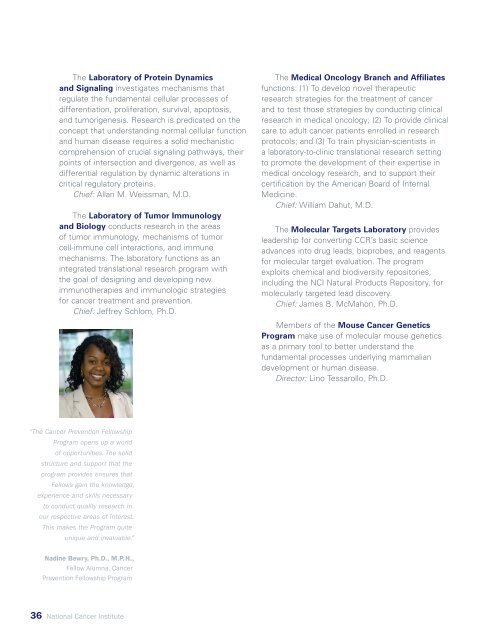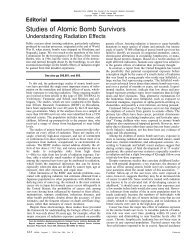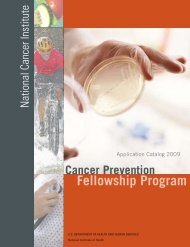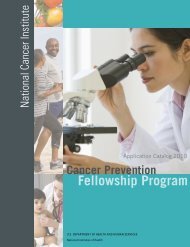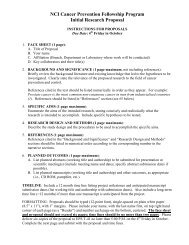Download Our Catalog - Cancer Prevention Fellowship Program
Download Our Catalog - Cancer Prevention Fellowship Program
Download Our Catalog - Cancer Prevention Fellowship Program
You also want an ePaper? Increase the reach of your titles
YUMPU automatically turns print PDFs into web optimized ePapers that Google loves.
The Laboratory of Protein Dynamics<br />
and Signaling investigates mechanisms that<br />
regulate the fundamental cellular processes of<br />
differentiation, proliferation, survival, apoptosis,<br />
and tumorigenesis. Research is predicated on the<br />
concept that understanding normal cellular function<br />
and human disease requires a solid mechanistic<br />
comprehension of crucial signaling pathways, their<br />
points of intersection and divergence, as well as<br />
differential regulation by dynamic alterations in<br />
critical regulatory proteins.<br />
Chief: Allan M. Weissman, M.D.<br />
The Laboratory of Tumor Immunology<br />
and Biology conducts research in the areas<br />
of tumor immunology, mechanisms of tumor<br />
cell-immune cell interactions, and immune<br />
mechanisms. The laboratory functions as an<br />
integrated translational research program with<br />
the goal of designing and developing new<br />
immunotherapies and immunologic strategies<br />
for cancer treatment and prevention.<br />
Chief: Jeffrey Schlom, Ph.D.<br />
The Medical Oncology Branch and Affiliates<br />
functions: (1) To develop novel therapeutic<br />
research strategies for the treatment of cancer<br />
and to test those strategies by conducting clinical<br />
research in medical oncology; (2) To provide clinical<br />
care to adult cancer patients enrolled in research<br />
protocols; and (3) To train physician-scientists in<br />
a laboratory-to-clinic translational research setting<br />
to promote the development of their expertise in<br />
medical oncology research, and to support their<br />
certification by the American Board of Internal<br />
Medicine.<br />
Chief: William Dahut, M.D.<br />
The Molecular Targets Laboratory provides<br />
leadership for converting CCR’s basic science<br />
advances into drug leads, bioprobes, and reagents<br />
for molecular target evaluation. The program<br />
exploits chemical and biodiversity repositories,<br />
including the NCI Natural Products Repository, for<br />
molecularly targeted lead discovery.<br />
Chief: James B. McMahon, Ph.D.<br />
Members of the Mouse <strong>Cancer</strong> Genetics<br />
<strong>Program</strong> make use of molecular mouse genetics<br />
as a primary tool to better understand the<br />
fundamental processes underlying mammalian<br />
development or human disease.<br />
Director: Lino Tessarollo, Ph.D.<br />
“The <strong>Cancer</strong> <strong>Prevention</strong> <strong>Fellowship</strong><br />
<strong>Program</strong> opens up a world<br />
of opportunities. The solid<br />
structure and support that the<br />
program provides ensures that<br />
Fellows gain the knowledge,<br />
experience and skills necessary<br />
to conduct quality research in<br />
our respective areas of interest.<br />
This makes the <strong>Program</strong> quite<br />
unique and invaluable.”<br />
Nadine Bewry, Ph.D., M.P. H.,<br />
Fellow Alumna, <strong>Cancer</strong><br />
<strong>Prevention</strong> <strong>Fellowship</strong> <strong>Program</strong><br />
36 National <strong>Cancer</strong> Institute


